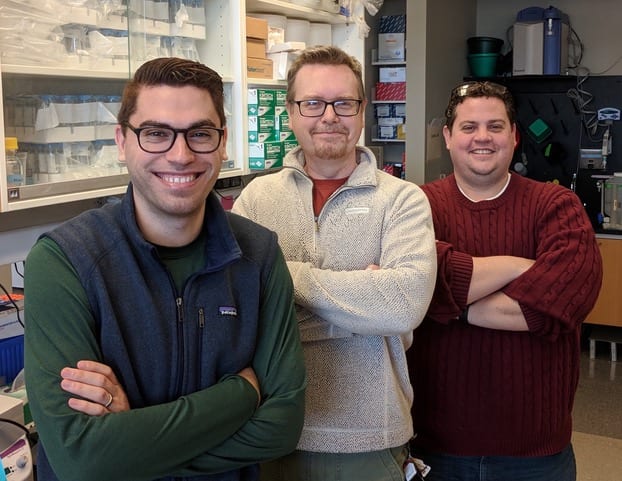Posted By: Sara Cullinan, PhD, Deputy Director, AJHG
Each month, the editors of The American Journal of Human Genetics interview the authors of a recently published paper. This month, we check in with Andy McCallion (@FunctionalDNA), Loyal Goff (@loyalgoff), and Paul Hook (@paul_hook_HuGen) of Johns Hopkins University to discuss their paper, “Single-cell RNA-seq of mouse dopaminergic neurons informs candidate gene selection for sporadic Parkinson’s disease.”

AJHG: What prompted you to start working on this project?
Andy: The challenge presented by endeavoring to connect common variation identified through genome wide association studies (GWAS) to affected genes and ultimately to the mechanistic understanding of disease gives all of us a headache. Where to start?
Although powerful, GWAS are inherently biologically agnostic. Despite the wealth of loci they implicate in disease, GWAS tell us nothing of the cellular context of disease or how variants mediate their effect/s. This, and the significant distances over which regulatory sequences/variants can act, complicates efforts to systematically identify gene candidates. We wanted to ask whether, beginning with an underlying biological insight into a pathologically vulnerable cell population, we could make progress on this challenge.
AJHG: What about this paper/project most excites you?
Andy: Perhaps the most exciting thing is that this work provides a biologically informed framework that systematically prioritizes candidate genes for an entire field, Parkinson’s Disease (PD). We were able to ask what (if anything) makes the transcriptomes of neurons in the substantia nigra unique among central nervous system dopamine neurons. We reasoned that any differences may contribute to their preferential vulnerability of this population in PD. The data we generated facilitated the exploration of gene networks underpinning the identity of all assayed dopamine subpopulations and in turn revealed that networks most associated with PD are active in the nigral population.
Stepwise integration of this data allowed us to establish a rubric, filtering over 1000 potential genes in 49 PD GWAS intervals to approximately 100. The genuine excitement was driven by the fact that the data holds up! Among these candidates are many established familial/syndromic PD genes. Further, we validate the functional requirement of a gene not previously known to be mutated in PD.
AJHG: Thinking about the bigger picture, what implications do you see from this work for the larger human genetics community?
Andy: Our work demonstrates that starting from an informed biological hypothesis of (one) cellular context in which a subset of variation might be expected to mediate their effect, can yield robust, testable hypotheses of the genes modulated in disease. We’re not naïve enough to think this story is complete; we recognize that much more work needs to be done – similarly evaluating other cell populations, conditions, etc. Many others are similarly seeking ways to reveal what cellular contexts are most pertinent to a range of disorders. We see this as a proof of principle whose observations will (hopefully) synergize with those from other groups.
AJHG: What advice do you have for trainees/young scientists?
Andy: That’s a tough one! My advice would not be technical. I frequently joke with my trainees that life is not complicated – we all have only two responsibilities. First, you need to get the best out of yourself – work hard, be curious, invest in the intellectual and technical platform you create for your science, think rigorously and creatively. Second, you need to get the best out of everyone else – be fair, honest, empathetic; share information generously, recognize what you can learn from the experiences of others.
Hold those things in tension and you will reach for your success, want to ensure the success of others, and simultaneously avoid being a jerk. The field of genetics/genomics has become so multi-disciplinary that throughout your career, you will need to develop many relationships – networks of colleagues. Hold yourself accountable for how you work and how you build and maintain relationships.
AJHG: And for fun, tell us something about your life outside of the lab.
Andy: Outside of the lab, Paul is an avid cook and enjoys time in the kitchen. Loyal is a talented photographer and musician but currently spends most of his time chasing after his two young children. I spend much of my free time woodworking – both at home and as the carpenter on the restoration of an active second world war Liberty Ship and living museum, working alongside my teenage son. Collectively our labs (Goff and McCallion) enjoy almost anything that involves food, drink, our families, and a great laugh.
Andy McCallion, PhD; Loyal Goff, PhD; and Paul Hook, BS, study neurogenetics at the Johns Hopkins University McKusick-Nathans Institute of Genetic Medicine. Dr. McCallion, an ASHG member since 2001, served on the Society’s Program Committee from 2012-13 and as its Chair in 2014. Dr. Goff and Mr. Hook have been ASHG members since 2015.
